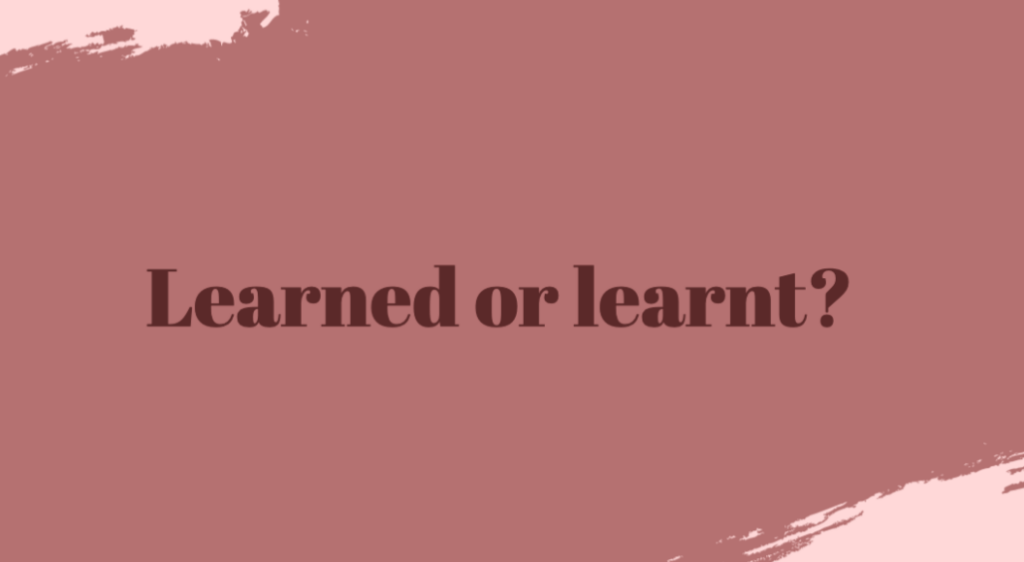What is the past tense of the verb ‘to learn’? Learned or learnt?
When it comes to learning English, understanding verb conjugation can be a challenge. One particular verb that often confuses learners is ‘to learn’ and its past tense form. In this article, we will clarify whether the correct past tense is ‘learned’ or ‘learnt.’ Knowing the right usage will help students communicate effectively in English.

Regular and Irregular Verbs:
In English, verbs can be regular or irregular. Regular verbs follow a predictable pattern, where the past tense is formed by adding ‘-ed’ to the base form. For example, ‘talk’ becomes ‘talked’ and ‘walk’ becomes ‘walked.’ However, irregular verbs have unique forms for the past tense.
The Verb ‘to Learn’:
The verb ‘to learn’ is irregular. In the past tense, it has two accepted forms: ‘learned’ and ‘learnt.’ The choice between these forms depends on regional preferences and dialects.
British English or American English: learned vs learnt
The choice of past tense form for the verb “learn” depends on your geographical location. In American English, thanks to Noah Webster (of Merriam-Webster’s Dictionary), the standard past tense form became “learned.” On the other hand, in UK English, which is the original form, “learnt” is preferred. The same pattern applies to other verbs like “spell,” “leap,” “lean,” “smell,” and so on.
Examples of the present tense form of “learn” in sentences:
- He had the opportunity to acquire English skills in Australia.
- The book discusses how children acquire knowledge.
- He’s in the process of learning to play the trumpet. (present participle)
- Everyone in the class had the chance to learn from one another.
- Most people acquire reading skills during childhood.
Examples of the past simple form of “learned/learnt”:
- We only found out who the new teacher was a few days ago.
- Today we acquired the knowledge of how to use the new software.
- I first discovered news of his death many years later.
- She received no training but quickly picked up the necessary skills on the job.
- I memorized the poem by heart.
Examples of the past participle form of “learned/learnt”:
- I had gained a lot of knowledge from my father.
- She gained knowledge by observing others.
- He acquired the skill of riding when he was about three years old.
- I’ve forgotten most of what I learned in school.
- How did they react when they received the news?
Here are other most commonly cited irregular English verbs:
- be (was/were, being, been)
- beat (beat, beaten)
- become (became, become, become)
- bend (bent, bent)
- bid (bid, bidden)
- bite (bit, bitten)
- blow (blew, blown)
- break (broke, broken)
- bring (brought, brought)
- build (built, built)
- buy (bought, bought)
- catch (caught, caught)
- come (came, come)
- cost (cost, cost)
- cut (cut, cut)
- do (did, done)
- draw (drew, drawn)
- drink (drank, drunk)
- drive (drove, driven)
- eat (ate, eaten)
- fall (fell, fallen)
- feed (fed, fed)
- feel (felt, felt)
- fight (fought, fought)
- find (found, found)
- flee (fled, fled)
- fly (flew, flown)
- forbid (forbade, forbidden)
- forget (forgot, forgotten)
- freeze (froze, frozen)
- get (got, got/gotten)
- give (gave, given)
- go (went, gone)
- grow (grew, grown)
- hang (hung, hung)
- have (had, had)
- hear (heard, heard)
- hide (hid, hidden)
- hit (hit, hit)
- hold (held, held)
- hurt (hurt, hurt)
- keep (kept, kept)
- kneel (knelt, knelt)
- know (knew, known)
- lay (laid, laid)
- lead (led, led)
- leave (left, left)
- lend (lent, lent)
- let (let, let)
- lie (lay, lain)
- lose (lost, lost)
- make (made, made)
- mean (meant, meant)
- put (put, put)
- read (read, read)
- ride (rode, ridden)
- ring (rang, rung)
- rise (rose, risen)
- run (ran, run)
- say (said, said)
- see (saw, seen)
- sell (sold, sold)
- send (sent, sent)
- shake (shook, shaken)
- shine (shone, shone)
- shoot (shot, shot)
- show (showed, shown)
- shut (shut, shut)
- sing (sang, sung)
- sit (sat, sat)
- sleep (slept, slept)
- slide (slid, slid)
- speak (spoke, spoken)
- speed (sped, sped)
- spend (spent, spent)
- spin (spun, spun)
- spread (spread, spread)
- spring (sprang, sprung)
- stand (stood, stood)
- steal (stole, stolen)
- stick (stuck, stuck)
- sting (stung, stung)
- swear (swore, sworn)
- sweep (swept, swept)
- swim (swam, swum)
- take (took, taken)
- teach (taught, taught)
- tear (tore, torn)
- tell (told, told)
- think (thought, thought)
- throw (threw, thrown)
- understand (understood, understood)
- wake (woke, woken)
- wear (wore, worn)
- win (won, won)
- write (wrote, written)
Leave a Reply